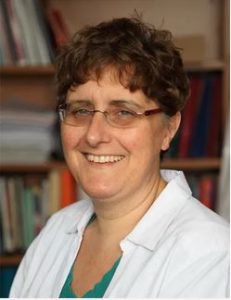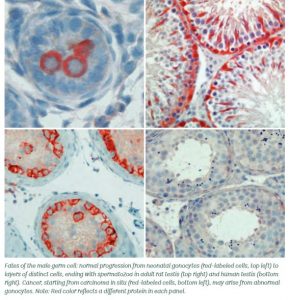Martine Culty, PhD, who has joined the USC School of Pharmacy as an associate professor, has been affectionately called “Madame Gonocyte.” She may not have originated the term for these germ cells that serve as the precursor to sperm formation, but if you Google “gonocyte,” her name appears near the top and in numerous entries.
 “The main focus of my research is male reproduction and endocrine disruption,” Culty explains. “I explore how these germ cells develop to support spermatogenesis and proper male fertility.”
“The main focus of my research is male reproduction and endocrine disruption,” Culty explains. “I explore how these germ cells develop to support spermatogenesis and proper male fertility.”
She also examines gonocyte’s role in testicular cancer, the most prevalent form of the disease in young men. While it can also strike later in life, testicular cancer usually afflicts males between 15 and 30 years old, “right as they are discovering the world and establishing their lives,” Culty notes.
This work is crucial as the rate of testicular cancer continues to rise. Environmental factors rank high among the potential causes she is investigating. “The male reproductive system is absolutely dependent on the hormones androgen and estrogen to develop,” Culty says. “And a lot of the chemicals in the environment disturb their homeostasis—their balance.”
 Culty’s own environment as a child was pivotal to determining her future career. “I grew up in France, in a suburb of Paris,” she says. “And I was always fascinated by biology, plants, animals—everything.” Squeamish about seeing people or animals suffer, she chose not to become a physician or veterinarian. Instead, pharmaceutical research beckoned her with the promise of achieving laboratory breakthroughs that could benefit many more patients than could possibly be cared for in person.
Culty’s own environment as a child was pivotal to determining her future career. “I grew up in France, in a suburb of Paris,” she says. “And I was always fascinated by biology, plants, animals—everything.” Squeamish about seeing people or animals suffer, she chose not to become a physician or veterinarian. Instead, pharmaceutical research beckoned her with the promise of achieving laboratory breakthroughs that could benefit many more patients than could possibly be cared for in person.
She brings to the school expertise in endocrinology, stem cells and the body’s
signaling pathways. “The techniques are very similar from one topic to the other,” Culty observes. “In general, it’s about how cells communicate and how disruption
can lead to some pathologies.”
Germ cells fascinate her “because they go really through a metamorphosis. You start with big fetal, round cells and you end up with a sperm. It’s like a miracle.”

